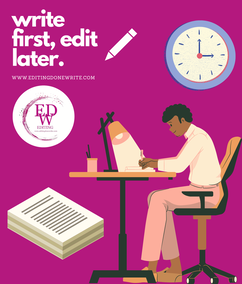 editing, writing, self-editing, time, authors, writers, books, publishing, schedules, advice, guidelines, create, revise, novel, professional, time management, first draft, improving your writing, how to, how to write effectively, how to write a book, creating a book editing, writing, self-editing, time, authors, writers, books, publishing, schedules, advice, guidelines, create, revise, novel, professional, time management, first draft, improving your writing, how to, how to write effectively, how to write a book, creating a book Writing is an art form that requires time and dedication. Whether you write professionally or as a hobby, writing can oftentimes be time-consuming and challenging. A common mistake that many writers make is trying to perfect their work as they go, picking at it so much that it takes forever to complete a finished first draft. First and foremost, remember that writing a first draft completely before editing allows you to focus on the creative process itself. Don't get hung up on the details. Give yourself permission to create, explore, and experiment with your ideas without nitpicking over the little things. Another reason to allow the first draft to flow is that it can help you maintain momentum and motivation. When you're constantly stopping and starting to revise and edit your work, it can be difficult to stay focused and maintain your momentum. (Are you always checking your phone or surfing the web, trying to jog your memory, and eventually just giving up for the day?) Reducing or eliminating interruptions altogether allows you to maintain a steady pace and get your ideas down on paper quickly and enables you to reach “The End” faster. Ever heard of analysis paralysis? I’ve heard it countless times. A writer has been working on their novel idea for YEARS. Chances are, they suffer from this condition in which they are so focused on perfecting their work that they're unable to move forward, leading to frustrating and decreased motivation, and, ultimately, may result in writer's block. All the more reason to stop picking and focus on keeping the creative flow going. Finally, saving the editing process for last can help you gain perspective on your work. It can be challenging to see the big picture and evaluate your work objectively when you're in the middle of writing. A good rule of thumb is to set aside your work for a couple of months and come back later with fresh eyes. But realistically, in the current publishing climate, readers demand more, now. So if you’re pressed for time, writing fluidly and returning to it after you’ve finished writing can go a long way in producing a similar effect, helping you identify areas that need improvement. At the end of the day, the best thing you can do for yourself is to focus on the process, not the outcome. Get into your story, the characters, the world you’re creating, and let the ideas and the words flow. I’m willing to bet when you come back later, you’ll ask yourself, “Did I really write this?” I’ve done it many times myself, and I bet when you try it, you’ll be impressed with what you’ve created. Trust in yourself! You can do it.
0 Comments
Leave a Reply. |
AuthorThis is a special place where authors can find helpful hints and tips that they can apply to their writing journey. If you have a topic you'd like me to write about, feel free to reach out and let me know! Archives
April 2023
Categories |

 RSS Feed
RSS Feed